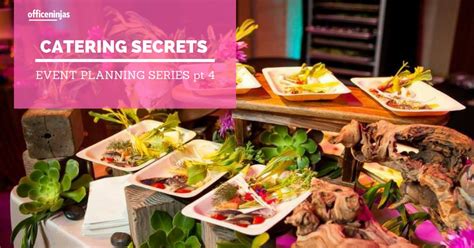Food and Beverage Planning for Events: A Comprehensive Guide
Planning a successful event hinges on many factors, but the food and beverage aspect is often the most memorable – and potentially the most problematic if not handled correctly. This comprehensive guide walks you through every step, ensuring your event's catering is a resounding success.
1. Defining Your Event's Needs
Before diving into menus and vendors, you need a crystal-clear understanding of your event's specifics. Consider these crucial elements:
- Type of Event: Is it a formal wedding, a casual birthday party, a corporate conference, or a festival? The event's formality significantly impacts food and beverage choices.
- Guest Count: Accurately estimating attendance is paramount for accurate ordering and budgeting. Overestimating leads to waste, while underestimating causes shortages and unhappy guests.
- Budget: Set a realistic budget early on. This will guide your choices regarding menu complexity, vendor selection, and beverage options.
- Dietary Restrictions and Allergies: Inquire about any dietary restrictions or allergies among your guests. Providing options for vegetarians, vegans, gluten-free diets, and other specific needs demonstrates thoughtful planning and inclusivity. Clearly label all food items to avoid accidental consumption of allergens.
- Venue: The venue itself might dictate certain aspects of food and beverage service. Some venues have in-house catering, while others allow outside vendors. Consider kitchen facilities, serving space, and accessibility.
- Theme (if applicable): If your event has a theme, incorporate it into your food and beverage choices. A themed menu adds an extra layer of engagement and memorability.
2. Crafting the Perfect Menu
With the event details established, it's time to create a menu that complements the overall experience:
- Menu Style: Choose between a buffet, plated service, family-style, or food stations. Each style offers different levels of formality and interaction.
- Food Selection: Offer a variety of options to cater to different tastes and dietary restrictions. Include appetizers, main courses, and desserts. Balance heavier and lighter options.
- Beverage Selection: Provide a selection of alcoholic and non-alcoholic beverages. Consider offering water, juice, soda, beer, wine, and cocktails. Always have plenty of water available.
- Seasonal Ingredients: Utilizing seasonal ingredients not only enhances flavor but also helps control costs.
3. Selecting Your Vendors
Finding the right caterer or food vendor is crucial. Consider the following:
- Experience and Reputation: Check reviews, testimonials, and portfolios to assess the vendor's experience and quality of service.
- Menu Options and Flexibility: Ensure the vendor can accommodate your menu preferences and dietary requirements.
- Pricing and Contract: Get detailed quotes and review the contract carefully before signing. Understand all inclusions and exclusions.
- Service Style and Staff: Inquire about the vendor's service style, staff professionalism, and equipment.
4. Logistics and Timing
Careful planning of logistics is key to a smooth event:
- Timeline: Create a detailed timeline outlining all food and beverage-related tasks, from vendor communication to setup and service.
- Equipment and Supplies: Coordinate with the vendor on all necessary equipment, including tables, chairs, linens, and serving utensils.
- Service Style Coordination: Ensure the service style aligns with the event timeline and guest flow.
- Cleanup: Discuss cleanup procedures with the vendor to avoid any post-event hassles.
5. Post-Event Evaluation
After the event, take the time to evaluate what worked well and what could be improved. This feedback is invaluable for future events. Gather feedback from attendees and vendors to identify areas for enhancement.
By carefully considering these points, you can create a memorable food and beverage experience that complements and enhances your event, leaving your guests feeling satisfied and well-cared for. Remember, attention to detail is critical in event planning, and the food and beverage aspect is a significant contributor to the overall success.
